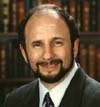|
Summary
of debate and links to statements
Overview of key Colombia-related votes
Key
Members:
Republicans:
 |
Trent Lott (R-Mississippi), the Senate majority leader,
opposed considering the Colombia assistance in its present
legislative form, as an "emergency supplemental"
appropriation for the year 2000. Lott added the Colombia
aid to the regular 2001 appropriations bills, and became
a key proponent.
- Motion
to proceed,
Sens. Trent Lott (R-Mississippi) and Tom Daschle (D-South
Dakota), May 18, 2000
|
 |
Ted
Stevens
(R-Alaska), Appropriations Committee chairman. At a February
24 hearing Stevens asked U.S. Southern Command Chief Gen.
Charles Wilhelm, "Who's going to go in if this blows
up? Tell me this is not a Vietnam again." Stevens nonetheless
supported the package, and had favored consideration of an
emergency supplemental appropriation for 2000. |
 |
Slade
Gorton
(R-Washington) introduced
an amendment at
the May 9 Senate Appropriations Committee markup that
would have reduced to $100 million the Foreign Operations
outlay for Colombia, essentially gutting the administration's
proposal. Sen. Gorton's amendment failed by a narrow margin,
with 11 voting in favor and 15 against. A similar amendment
introduced in the full Senate debate failed by a wider 79-19
margin.
|
 |
Mitch
McConnell
(R-Kentucky), chairman, Foreign Operations Subcommittee. McConnell
expressed concern about the aid package at a February 24th
hearing, noting that "The more the administration spends
in Colombia, the more coca is grown." He nonetheless
supported the Senate's version of the package. |
 |
Mike
DeWine (R-Ohio) and Paul Coverdell (R-Georgia)
authored legislation in October 1999 that offered military
and police aid to Colombia. The "Alliance with Colombian
and the Andean Region (Alianza) Act" (S.1758) in many
ways resembles the administration's January 2000 proposal.
- Speech
by Rep. Mike DeWine (R-Ohio), May 18, 2000
- Speech
by Sen. Paul Coverdell (R-Georgia), March 29, 2000
- Alliance
with Colombia and the Andean Region (ALIANZA) Act of 1999
(S. 1758)
- Sen.
Mike Dewine (R-Ohio), press release,
October 20, 1999
- Sen.
Paul Coverdell (R-Georgia), press
release, October 20, 1999
|
 |
Lincoln
Chafee, who heads the Western Hemisphere Subcommittee
of the Foreign Relations Commitee, voiced strong doubts
about the Colombia aid package at a February 25 hearing.
- Statement
of Subcommittee Chairman Sen. Lincoln Chafee (R-Rhode
Island), February 25, 2000
|
Democrats:
 |
Bob
Graham (D-Florida) was perhaps the Senate's most outspoken
supporter of the aid package.
|
 |
Minority
Leader Tom Daschle (D-South Dakota) helped push the
administration's aid package through the Senate.
- Motion
to proceed,
Sens. Trent Lott (R-Mississippi) and Tom Daschle (D-South
Dakota), May 18, 2000
|
 |
Patrick
Leahy
(D-Vermont), ranking member, Foreign Operations Subcommittee.
Sen. Leahy added strong human rights conditions to the Senate's
version of the new military aid for Colombia. At a February
24 hearing Leahy warned, "I have serious doubts about
the Administration's approach. ... It is just as likely
that it will lead to a wider war, more innocent people killed,
more refugees uprooted from their homes, and no appreciable
change in the flow of cocaine into the United States."
- Statement
of Sen. Patrick Leahy (D-Vermont), hearing of Senate Foreign
Operations Subcommittee, February 24, 2000
|
 |
Joseph
Biden (D-Delaware),
the ranking member of the Senate Foreign Relations Committee,
said at a February 22 hearing that he supports the administration's
proposal, but hopes the aid will be managed with utmost
openness. "We should seek transparency ...about the numbers
of U.S. forces present in the country, transparency about
the use of our equipment, and transparency about the activities
of the U.S.-funded battalions." Biden traveled to Colombia
in April 2000.
- Report
to the Senate Committee on Foreign Relations by Sen. Joseph
Biden (D-Delaware), May 3, 2000
- Press
release by Sen. Joseph Biden (D-Delaware), May 3,
2000
- Statement
of Sen. Joseph Biden (D-Delaware), February 22, 2000
- Press
release from Sen. Joseph Biden (D-Delaware), February
22, 2000
|
 |
Sen.
Paul Wellstone introduced an amendment to transfer funds
away from Colombian military aid and into domestic drug
treatment. The amendment failed by a vote of 89-11.
|
 |
The
views of Christopher Dodd (D-Connecticut), the ranking
member of the Western Hemisphere Subcommittee of the Foreign
Relations Committee, were made clear in a March 6 New
York Times article. "Mr. Dodd acknowledged that
he had returned from Colombia just days before the aid plan
was made final in December and had told senior administration
officials he would support it. But he said he did so reluctantly,
pushing for more economic development aid, and he insisted
that he never pressed the officials to buy Blackhawks."
(The UH-60 Blackhawk helicopter is a product of Sikorsky,
a Connecticut-based manufacturer and a division of United
Technologies.)
Dodd
introduced an amendment that would likely have put Blackhawk
helicopters back into the Senate's version of the aid package.
It failed by a 51-47 vote.
- Speeches
by Sen. Christopher Dodd (D-Connecticut) and Sen. Dianne
Feinstein (D-California), April 13, 2000
|
 |
Robert
Byrd
(D-West Virginia), ranking member, Appropriations Committee.
Speaking on the floor of the Senate on February 29, Sen.
Byrd said, "The White House calls this funding an emergency.
I think we have more than enough emergencies here on our
home soil that demand urgent attention. It is time to get
our priorities straight."
- Statement
by Sen. Robert Byrd (D-West Virginia), May 9, 2000
- Speech
by Sen. Robert Byrd (D-West Virginia), February 29, 2000
(brief mention of Colombia package)
|
 |
A
skeptic about the aid package, Richard
Durbin
(D-Illinois) changed his position after traveling
to Colombia in mid-June with Sen. Jack Reed (D-Rhode Island).
- Speech
by Sen. Richard Durbin (D-Illinois), June 19, 2000
|
|

